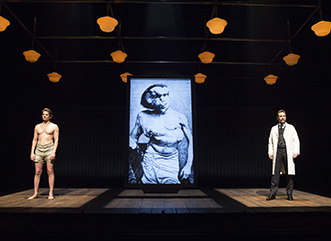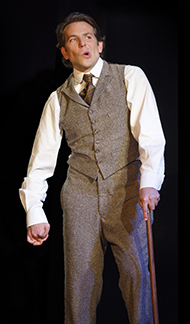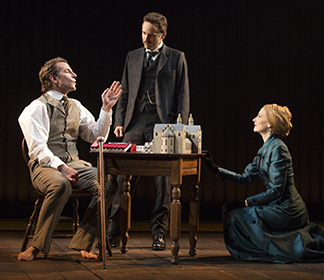By Lucy Komisar
A mix of cruelty and humanity, a bit of voyeurism, and some fascination at an indomitable human spirit are the stuff of Bernard Pomerance‘s play “The Elephant Man,” in a moving revival directed by Scott Ellis.
The play, staged first in 1977 in London, imagines the trials and unusual accomplishments of Joseph Merrick, who lived in Europe in the late 1800s, afflicted by a disease so appalling – misshapen body, face distorted by a fungus that grew massively on his head, skin like an elephant‘s hide – that his unfeeling Belgian mother shipped him to a carnival freak show.

Bradley Cooper plays Merrick sensitively, without makeup but with a twisted face, misshapen body, deformed right hand and a limp. He imagines that his body was destroyed, because his mother was knocked down by an elephant in the circus.
As a child, he suffered cruelly. He was in workhouse where, he recalls, they beat him like a drum, “boom boom.” In Brussels, he moved covered up with a gray robe.
A London doctor, Frederick Treves (Alessandro Nivola), who wants to examine him in the interests of science, brings him to a research hospital. The time is 1886 to 90. We see slides of his deformities. The doctor says people believe he brought it on himself. A discussion is who deformed him, God or Darwin? Nivola is properly rigid as the doctor who has an inner rule book of how people should behave.

We discover that as horrific as Merrick‘s outside is, his inside is quite sensitive and human. He says he‘d like to go to a home for the blind. How smart to choose a place where his sight would trump his looks.
When the hospital porter is found to have let people in to see Merrick at night, for cash, he is fired. Merrick wonders if his children will go to the workhouse. Treves tells him people must obey rules, and has Merrick repeat, “Rules make us happy because they are for our own good.” But Merrick tells Treves, “If your mercy is so cruel, what do you have for justice?”
Treves makes Merrick, on the outside, a Victorian gentleman with proper clothes. But he has no sense of a man’s emotional life.
At a moment when Merrick thinks about killing himself, the doctor introduces him to Mrs. Kendal (Patricia Clarkson), the actress. Clarkson plays her with charm and intelligence. Kendal understands his loneliness. She learns that he is misshapen in body but not intellect.

He is in many ways so smartly human. Mrs. Kendal introduces him to society. We see him dressed in suit and vest, meeting at the salon she has arranged to present royals and aristocrats. He is elegant in speech. In their self-centered ways, they see him as images of themselves, artistic or practical or religious. But, quite fascinating, they ignore his deformity.
This “thing” is also a man. He talks to Mrs. Kendal about wanting to see a naked woman. He wants to be like others. And she generously pulls open her vest. But Treves discovers this and, the worst kind of Victorian moralist, orders they not meet again.
What kind of morality ignores pain? Merrick wonders about the doctor, who is a surgeon, “Is it OK to see them naked if you cut them up afterwards?”
Merrick, “the defective,” has a moral sensibility superior to most of his society. Told he is not allowed to feel like a man, he considers that his alternative is death.
Ellis‘s production is clear and spare, without the clutter of too much scenery.
The Victorian story is relevant today, as Treves conjures up the repressive anti-sexuality that continues in the U.S. and elsewhere under the guise of hyper-morality.
“The Elephant Man.” Written by Bernard Pomerance, directed by Scott Ellis. Booth Theatre, 222 West 45th Street, New York City. (212) 239-6200. Opened Dec 7, 2014; closes Feb 22, 2015. 12/25/14.

